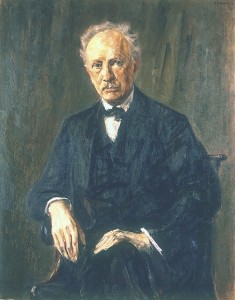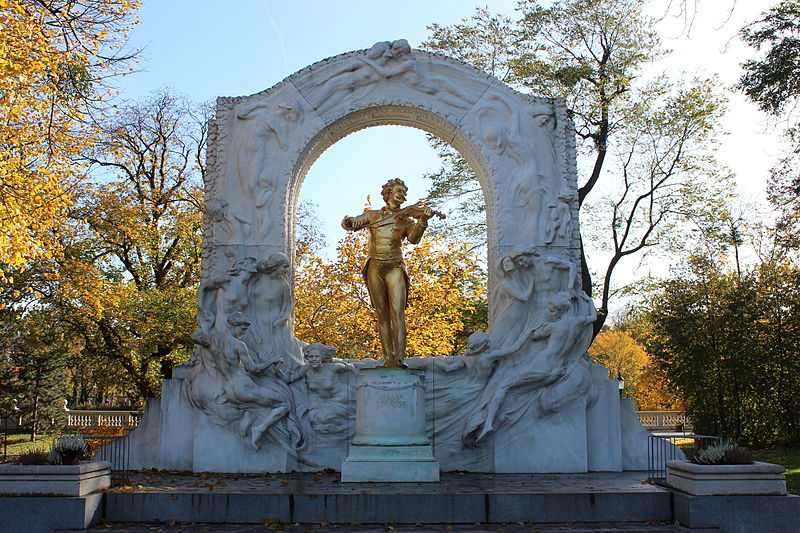“So there you have the four famous Strausses!” With finality, I swirled from my imaginary podium in the aisle and plopped back into the front seat of the bus, thus concluding one of the mini-lectures I give while in transit on tours. These talks last about ten minutes and arise for various reasons, some planned, some triggered by incidental events along our itinerary.
I was about to settle in after this one and open a bag of Austrian paprika chips, hoping I’d done a decent job of it, when a voice arose from the middle of the bus: “What about the fifth Strauss?”
Did I hear that right? I wondered. Actually I barely heard it since we were moving on a bus. And, please know that when I say “bus,” I’m referring to a 55-passenger Mercedes touring coach with plush leather seats, sleekly designed mega-windows, USB ports at each seat, and even, at times, cappuccino machines. Amidst so much luxury, it makes sense that it’d be hard to hear a single voice.
But my traveler repeated his question: “The other 19th-century Strauss who is so famous, what about him?”

What other famous Strauss might he mean? There’s Richard Strauss (1864-1949), the extraordinary composer of powerful, innovative tone poems popularized for many Americans when the film 2001: A Space Odyssey announced itself with the stark fanfare and powerful chords that begin his Also Sprach Zarathustra. Later, this same Richard Strauss would produce a series of extraordinary operas, each of which pricked the ears of the musical world for different reasons. If you have to pick one Strauss, he, without question, is “it.”
But there’s also Richard’s father, Franz Strauss (1822-1905), a horn player noted across the Hapsburg Empire for his virtuoso playing. He actually played horn for the premiere of four Wagner operas at a time when few brass players could manage the demands Wagner made. Still, Franz might have been forgotten by now, had it not been for his ultra-famous son. But he hasn’t been, and we owe to him the fact that Richard grew up in an intensely musical household, getting a massive jumpstart on his musical education and surely achieving far more than he would have without it.
After that, we switch families completely to enter into the world of the two most beloved Strausses: Johann Strauss Sr. (Johann Strauss I, 1804-1849), who poured out strings of waltzes, quadrilles, gallops, and other popular pieces. He authored the hit tune Radetzky March that still sparks every audience to break out into gleeful clapping and uncontrollable smiles. Try it for yourself.
And finally, there’s his son, the composer most people think of when coupling the surname “Strauss” with music: Johann Strauss Jr. (Johann Strauss II, 1825-1899).

A chip off the old block, although not always happily so, Johann II earned the forever-title “the Waltz King.” He earned a lot of money too, a fact nicely reflected in his golden statue that graces the Hofgarten in Vienna. Johann II’s legacy goes beyond his eternally popular waltzes such as The Blue Danube and Tales from the Vienna Woods, and extends to his still commercially successful operettas, prime among them the beloved Fledermaus (The Bat).
And yes, people do get confused by all these Strausses. I remember being confused about them as a music student, at one point embarrassing myself in class after making two of them into same person. So a mini-lecture seemed in order, particularly after the glorious evening concert we’d enjoyed two nights earlier in a Viennese palace where the second half of the program consisted of music by both Johanns, ending with the irresistible Radetzky March.
But now a fifth Strauss was on the table. What to do? Strauss is a common name. Kind of like Smith. There have to have been many musical Strausses. And our Smithsonian guests tend to be well versed, often serving as my teachers by informing me of books, films, festivals, and historical facts that hitherto have escaped my notice. But a fifth Strauss?
 The joke of course was on me. Just as I was about to admit defeat, a titter of laughter came from the whole bus. “Levi,” my traveler calls out. “Levi Strauss.”
The joke of course was on me. Just as I was about to admit defeat, a titter of laughter came from the whole bus. “Levi,” my traveler calls out. “Levi Strauss.”
“Who?” I blurted, racing through my entire index of obscure names hoping to recall a court composer with the first name Levi. “Blue jeans,” the voices chimed. Slower than I want to admit, I got the joke and collapsed in laughter.
“Never has anyone pulled that on me,” I chortled. “And believe me, I’m going to use it from now on!”
So I am using it . . . for two reasons. First, it was funny, although funnier than I can narrate (one of those “you had to be there” moments). But secondarily, it paves the way for me to submit an apology for a big blooper I let slide by in last-week’s post, when I made reference to the radical opera Salome being composed by Johann Strauss.
I’d be willing to bet the farm that neither Johann I nor Johann II, even in their wildest dreams, could come up with ten minutes of Richard’s Salome. So giving this operatic credit to either “Johann” is, at best, bizarre.
Yet, this accidental misattribution typifies the kind of mistake I make (and perhaps you too?), where something is so obviously wrong, yet it passes my eyes as correct. Had I just misspelled Johann, I’d like to think I would have caught that. But placing the name of Johann with the name Strauss? That fit nicely. After all, what goes better than Johann after sending time with Sacher Torts and ebullient waltzes?
So mea culpa. Phew, I feel better. And if you haven’t read about Levi Strauss 1829-1902, the “Blue Jean Guy,” you might find him quite interesting. No, he was not Viennese, although his family emigrated from a distinctive area of Bavaria called Franconia. He sailed to America as an 18-year old with his parents, settling first in New York, and then traveling boldly out to California where he founded his company producing the all-practical garment we today call blue jeans. His goals back them were to make them tough and affordable. He’d be shocked today seeing just how his blue-jean tradition has developed, don’t you think?
And with that, I want to wish everyone a beautiful autumn weekend, one that may be filled, for you, with fall festivals, State Fairs, football games, or raking leaves. Perhaps a few Strauss waltzes will be just the thing to enliven your household, although we associate them much more as musical symbols of winter, due to the long tradition of winter Carnival Balls, as well as the glittering New Year’s Day concerts broadcast annually from Vienna.
But they sound terrific in any season. If nothing else, try playing the Radetzsky March to motivate your little ones to roll out of bed. You may find the oatmeal goes down and teeth get brushed more enthusiastically with this energy filling the air.



